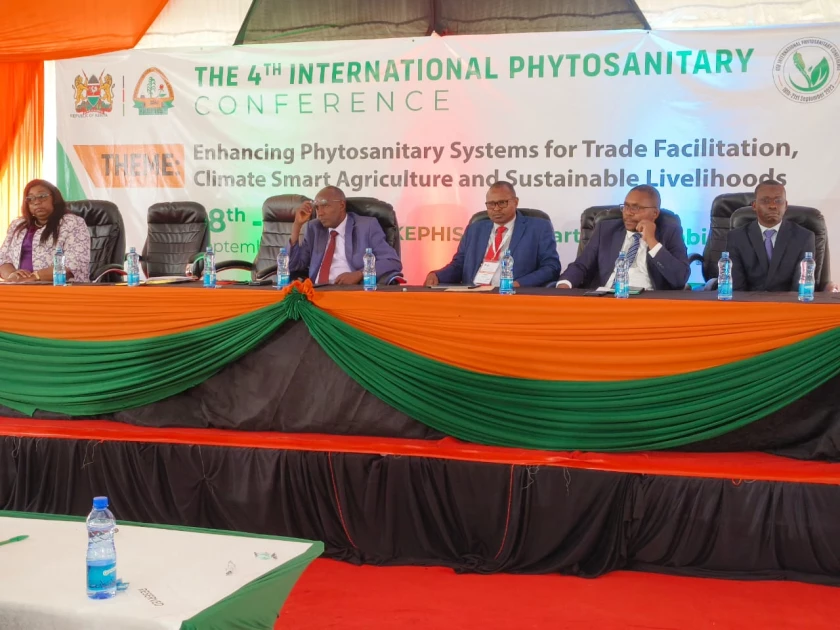Kenya hosts international phytosanitary conference

Kenya hosts international phytosanitary conference

Audio By Vocalize
Cabinet Secretary for Agriculture and Livestock Development Mithika Linturi, in a speech read by Principal Secretary (PS) Kello Harsama, Linturi acknowledged the government’s mandate on safe food provision.
The address comes at a time when Kenya is experiencing tough economic times which has also affected the Agricultural sector.
Under Article 43 of the Kenyan Constitution, the Government is mandated and has a civic duty to achieve the right to nutritious food for all Kenyans.
The speech by Linturi was delivered at Kenya Plant Health Inspectorate Service (KEPHIS) headquarters in Nairobi where KEPHIS is playing host to a number of Agricultural delegates from Europe, the United States and the African continent, who are meeting to deliberate on measures of seeds, plants, food safety and security.
The forum is themed: ‘Enhancing phytosanitary systems for trade facilitation, climate-smart agriculture and Sustainable Livelihoods.’
Phytosanitary entails international measures in place for adherence to the safety of life, and the health of plants and plant products. It involves measures in control of pests, plant disease, and pesticides among other contaminants in plants.
Sanitary and phytosanitary (SPS) measures refer to biosecurity measures which are applied to protect human, animal or plant health from risks arising from the introduction or establishment and spread of pests and diseases and risks arising from additives, toxins and contaminants in food and feed.
Kenya’s Economic Growth has been heavily reliant on the agriculture sector, which has a direct and significant bearing on food security, economic growth and social stability.
According to Linturi, threats to plants for instance from pests and diseases, cross-boundary transfer of pests through international travel and trade, disruptive human activities and climate change are increasingly contributing negatively to efforts toward attaining food security.
“This means that as the African continent produces food, it needs to know how to militate against the challenges of pests and diseases which have been identified to cause up to 40% reduction in yield according to Food Agriculture Office (FAO),” read part of his speech.
Linturi promised support for the recommendations that would be realized from the 4-day conference, and support for the phytosanitary fraternity on all fronts so as to realize yield impact on food security.
“As we look ahead to the coming years, we must be ready to move decisively—together—for the sake of our planet, prosperity and for people everywhere. No agenda is more important now for Africa than food security,” he concluded.
According to Joseph M’eruaki M’uthari Chairman- Board of Directors, KenyaPlant Health Inspectorate Service; the sharp increase in international movement of plants, plant products and regulated articles has come with challenges that necessitated the enhancement of sanitary and phytosanitary measures.
“KEPHIS has heavily invested in Pest Risk Analysis, border surveillance and inspection, quarantine and diagnostic systems, and analytical testing capacity that support import and export of plants and plant produce,” he stated.
Further, M’uthari informed the scientists that Kenyan fresh produce is globally acclaimed and that KEPHIS, as the gate-keeper on matters phytosanitary has played a key role in ensuring that they meet the market requirements and earn Kenya the high foreign exchange it continues to earn.
As for Prof. Theophilus Mutui, Managing Director, Kenya Plant Health Inspectorate Service; The International Plant Protection Convention (IPPC)and Kenya’s regulations on plant protection provide a framework for the protection of plant resources from the introduction and spread of pests.
“Phytosanitary measures are the foundation of our mandates as National Plant Protection Organizations (NPPOs) and provide the means for the protection of plants and plant resources from introduction, spread and establishment of foreign pests and diseases.”
“As an NPPO, we are guided by the International Standards for Phytosanitary Measures which enables us to implement activities that regulate importation of plants, plant products and other regulated articles.”Mutui maintained.
Other keynote speakers were Dr Sandrine Loudit; Acting Coordinator-Inter-African phytosanitary Council of African Union(AU-IAPSC), Dr. Andrew Edewa, the Director of the Standards SPS Programme at TradeMark Africa (TMA), Dr. Morris Akiri, Senior Regional Director, CAB International (CABI) among others.
The 4th International Phytosanitary Conference comes to a close on 21st September 2023.


Leave a Comment